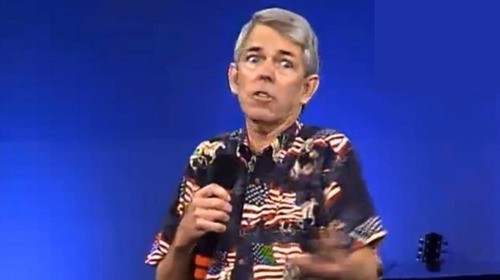Oral Roberts University had a very good men’s basketball team in 1972. According to Wikipedia, the Oral Roberts Golden Eagles led the nation in scoring that year, averaging 105.1 points per game. That’s no small feat for any college, especially a private religious institution that had started with only 300 students just seven years prior. One of ORU’s most prominent alumni, evangelical speaker David Barton, had nothing to do with achieving the feat. According to the Public Relations office of ORU, “there is no record of a David Barton ever playing basketball for ORU.” Yet Barton, who graduated from ORU in 1976, has told a different story. In a 2015 speech at Charis Bible College, Barton implied that he played Basketball at ORU by telling the audience:
“I remember when I was playing basketball, the college stuff that we did. We started every day with a five mile run, then we lifted weights, then we had an hour of racquetball, then we had two hours of full-court basketball, then we came back for another run. It wasn’t particularly enjoyable, but in those years, our college team set the NCAA record for two years in a row for most points scored. We averaged 105, 104, 103 points a game, I forget what it was. But you had to run a lot, it wasn’t a lot of fun, but you get the results.”
On its face, Barton’s story seems incredible. An hour of running five miles, an hour of racquetball play, two hours of full court basketball, and another hour of running would be a grueling everyday schedule even for a college athlete in the prime of his life. Add the everyday responsibilities of completing class work and Barton’s “every day” workout schedule seems anything but credible When interviewed, an Oral Roberts athletics trainer from the 70s era provided no substantiation for Barton’s story. For all appearances, it seems like David Barton told one big, yet innocuous lie. Sadly, this isn’t uncommon on the evangelical speaking circuit, where truth can often take a backseat to an interesting story or illustrative anecdote.
Yet Barton’s untruth is a particularly troubling case. He is the unofficial American historian of American right-wing Christianity. This is despite the fact that his most notable publication, The Jefferson Lies, was roundly condemned by historians and removed circulation by Christian book publisher Thomas Nelson. Barton’s undergraduate degree is in religious education, not history. Furthermore, his alma mater, ORU, was founded by the infamous prosperity gospel televangelist Oral Roberts. A degree from and association with that institution should cause the Bible-believing community to lose respect for him. Instead, he regularly draws crowds of pastors to Washington DC through his “Wallbuilders” organization for historical lectures and has been a high ranking official in the Republican Party. Barton has claimed an “earned” Ph.D. from the same diploma mill as Joyce Meyer. To the embarrassment of Christians everywhere, David Barton is symbolic to the left of the typical politically-minded Christian. According to the leftist media group Right Wing Watch, Barton’s work is “so routinely riddled with errors and misrepresentations that just about any factual claim that he makes ought to be checked for accuracy.”
The intellectual dishonesty of David Barton should not be the image put into the minds of lost people. Christians should be leading the way in the realm of open, honest, forthcoming scholarship. If the souls of the lost are to be won, it is not by the political operations of a faux-historian who seems to have only American pastors and TBN-viewers fooled about his complete lack of qualification. The visible church should be policing itself. Rather, it is put to open shame when non-believers and leftists must take the lead in exposing false claims of David Barton and his ilk.
*Please note that the preceding is my personal opinion. It is not necessarily the opinion of any entity by which I am employed, any church of which I am a member, any church which I attend, or the educational institution at which I am enrolled. Any copyrighted material displayed or referenced is done under the doctrine of fair use.











